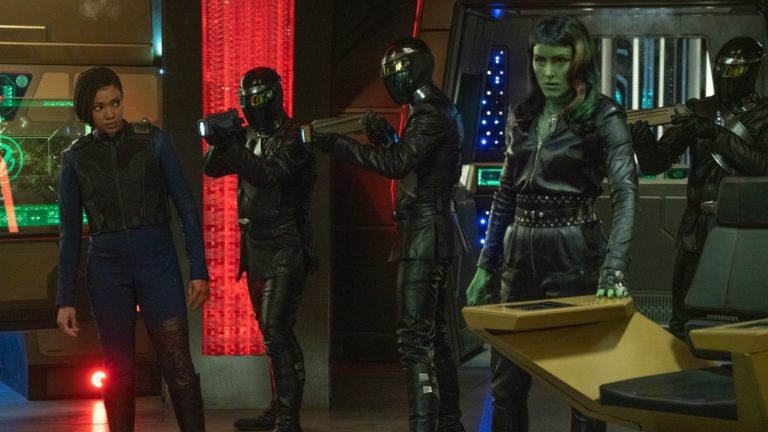What to Watch Verdict
Some major fumbles aside, this season of Discovery came to a satisfying conclusion.
Pros
- +
🖖🏻Great action beats and a tense ticking clock.
- +
🖖🏻Su'Kal's emotional closure is genuinely moving.
Cons
- -
🖖🏻Absolutely bizarre narrative choices to establish intrigue for next season, all of them concerning.
- -
🖖🏻The Emerald Chain went right back to being boring.
This article contains spoilers for Star Trek: Discovery.
Check out our review of last week's episode here.
In spite of its episode title, the season finale of Star Trek: Discovery’s third season is not really a thematic bookend to its premiere. It certainly functions as a mostly satisfactory conclusion to this season of television, albeit in a manner that has to split the baby between action setpieces and actual philosophical depth and emotional closure, but it mostly does a very good job at using its marginally extended runtime to give almost every major character something to do, tie up the Emerald Chain conflict in a neat bow, and bring Su’Kal to the confrontation with his worst fears. All that is fine and good. However, the devil’s in the details, and some choices that were almost certainly made to set up next season feel pretty questionable at this point, at the very least because they feel combatively unsatisfying.
To address the elephant in the room that I was personally most anxious about, we still know next to nothing concrete about how Gray (Ian Alexander) fits into this series. Apparently, he can manifest to more people than Adira (Blu del Barrio) when in the radiated holodeck, but he serves little plot function and is no more a realized character than a problem for Adira to obsess over. I’ve been willing to give this subplot the benefit of the doubt, considering how impactful its introduction was, but at the end of the season, we’re still left with a writer’s room teasing that the queer burial trope could eventually be subverted for Gray while holding his partner in a developmental holding pattern. How tediously frustrating and, above all, boring.
Further disappointment abounds in the decision to promote Michael (Sonequa Martin-Green) to the captaincy in the final moments of the season. It’s played up as a big reward for Michael’s ingenuity and bravery, assented to by Tilly (Mary Wiseman) and enforced by Admiral Vance (Oded Fehr), but to be frank, this twist is bullshit. Not only does it completely undermine the growth in leadership demonstrated by both Saru (Doug Jones) and Tilly in equally extreme circumstances, thereby leaving their character arcs flapping in the wind, but it also contradicts Michael’s trajectory for the entirety of this season, if not the entirety of the series. Michael’s biggest character flaw is that she has trouble separating what she wants most for herself from what is best for Starfleet, and though that might be interesting to explore from a captain’s chair, the narrative conceit of a Trek show that isn’t focused on a captain protagonist remains one of the most novel aspects of Discovery’s cast makeup. To take that away so suddenly and without proper set-up... Well, it's simply illogical.
Thankfully, there’s enough of a fully realized episode going on here that it’s still an enjoyable ride, fumbled character arcs aside. The action choreography as Michael and Book (David Ajala) fight off Osyraa (Janet Kidder) and the Emerald Chain makes for a very entertaining bid to take back control of the ship, while Tilly and the bridge crew’s struggle to sabotage the nacelle to prevent Osyraa’s escape from justice adds a tangible ticking clock that is only further complicated after Osyraa cuts off their life support. It’s not exactly the most intellectually satisfying half of the episode – the throwaway line that the Emerald Chain entirely dissolves with Osyraa’s death is laughably simplistic – but it’s a fun conclusion to a season-wide villain conflict that was, in retrospect, half-baked at best.
Much more gratifying is Saru’s connection with Su’Kal (Bill Irwin), bringing the fellow Kelpien out of his shell to confront his greatest traumas and to venture into the outside world. This is a perfect mirror to Saru’s own growth from a timid officer to a confident captain, and it’s genuinely moving to watch someone with lived experience in fear to help someone similar move past his own. There aren’t really any mysteries left to solve about Su’Kal’s role in causing The Burn, so it’s simply satisfying to see a new character's arc come to a close and to give closure to an emotional thread that ran through the season.
The final shot of the episode is a quote from Gene Roddenberry, alluding to the rarity of human connection and the beauty it has to heal and create anew. In a season all about forging connections between cultures pulled apart by tragedy – a tragedy which was itself caused by a traumatic separation of mother and child – this is an apropos sentiment, even if that never was the most resonant message in any part of the season but this final arc. Though I have more than a few major concerns about what Discovery’s fourth season might entail, I do think this season has earned these writers the benefit of the doubt. We can only hope that the heights of this season weren’t an anomaly and that the future of the Federation continues to boldly go, if not to where no one has gone before, then to some strange new interpretations of its worlds.
Star Trek: Discovery is available to stream on Paramount Plus.
Leigh Monson has been a professional film critic and writer for six years, with bylines at Birth.Movies.Death., SlashFilm and Polygon. Attorney by day, cinephile by night and delicious snack by mid-afternoon, Leigh loves queer cinema and deconstructing genre tropes. If you like insights into recent films and love stupid puns, you can follow them on Twitter.












